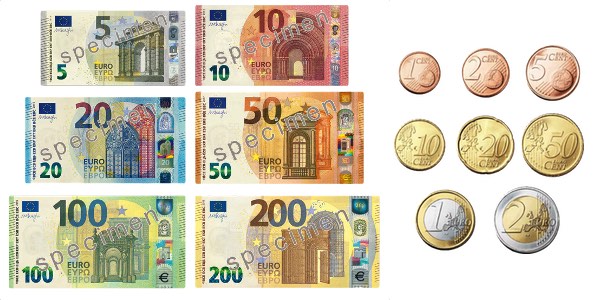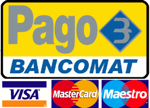Money, Banks and Taxes

Euros can be obtained in Italy at any bank, ATM machine or Exchange Office (Ufficio di Cambio) at airports, railway stations and in several other locations in all the major cities.
Credit/Debit Cards and ATMs

Credit and Debit Cards are widely spread in Italy and most restaurants and shops will accept major cards such as Visa and MasterCard. If you’re planning to pay with a Credit or Debit card, look at the front window of the establishment where the logos of the credit cards accepted will be posted (or simply ask: “Accettate carte di credito?”).
Cafes and smaller stores don’t usually tend to accept Credit or Debit cards, especially for amounts of 10 euros or less. In other words, it may be hard to pay for your morning croissant (cornetto) and cappuccino with anything other than cash.
Bancomats (the Italian equivalent of ATMs) are easy to find in all major cities. Always look for the local bank, which is almost always located on the main square. Unlike in North America, ATMs are very rarely found in establishments or stores.
Before leaving for your trip, it’s a good idea to contact your Credit/Debit Card Company as well as your Bank and inquire about international credit card circuits your card is part of, the maximum daily amount that you can withdrawn in cash, international fees, charge fees for ATM withdrawals and/or cash advances. It is also a good practice to let them know you will be traveling abroad, as some banks might block your card if they see unusual transactions from another country!
Banking Hours
Banks in Italy are generally open Monday through Friday from 8:30 a.m. to 1:30 p.m. and from 3:00 – 4:00 p.m. Banks are closed all day Saturday and Sunday and on National holidays.
Tax Refunds for Travelers
The prices of goods in Italy already include IVA (Imposta sul Valore Aggiunto), Italian for VAT (Value Added Tax), whenever applicable. So the price you see is the price you pay – no need to account for extra taxes.
Non-EU residents can claim a refund for the Value Added Tax on all goods purchased in Italy and intended for personal use or as a gift. To obtain this refund, the store in which you made purchases should provide and stamp a special VAT return form. Once stamped and filled out, this form and all receipts with clearly defined purchase prices and VAT information must be presented with your unopened purchases to the Customs Office at the airport in your city of departure. You will them be able to receive reimbursement for the VATs.
For purchase eligibility and for more information on how to claim your refund visit here.
